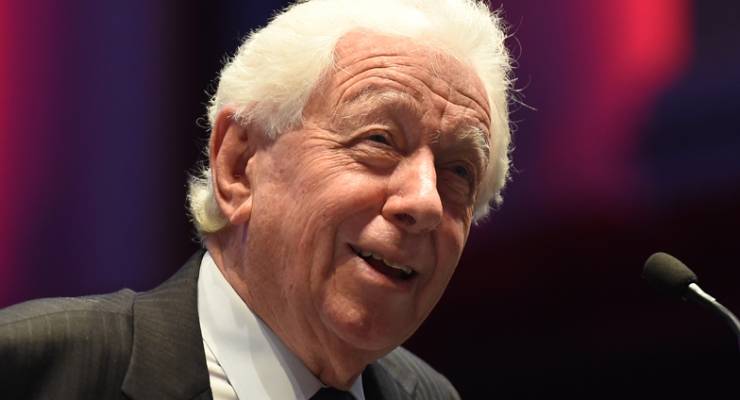
The ABC’s Four Corners program is banging the drum hard ahead of tonight’s long-overdue examination of Australia’s opaque system of campaign finance and political donations.
As usual, this is a difficult story to cover because donors and the major political parties are reluctant to front the cameras. Don’t be surprised if the great Liberal Party of Australia fails to have anyone talking for it on this most important governance issue being examined by the national broadcaster’s premier investigative program.
However, shopping centre giant Westfield did let a Four Corners crew into its recent AGM, when I hit cranky billionaire founder Frank Lowy with a series of questions about the property developer’s generosity with politicians over the years. It should make for interesting television.
Frank’s attitude to the subject of governance was revealing at the AGM, including on the question of heavily funding the Clintons over the years.
The decision to finally do a major ABC investigation on political donations might have been influenced by this Crikey piece back in February pointing out how Aunty’s various flagship programs had failed the public over the years by delivering sparse coverage of the annual February 1 donations data dump.
The teaser released by Four Corners last Thursday includes this:
“And in an exclusive interview with Four Corners, the regulator withholding more than $4 million dollars of funding destined for the Liberal party breaks his silence.”
That would be Keith Mason, the former judge-turned-chairman of the NSW Electoral Commission, who has withheld $4.4 million of public from the NSW Liberals after the party received $700,000 in donations through the Free Enterprise Foundation, some of which from prohibited sources such as property developers like Westfield.
The full list of those 73 donors was revealed online in an ICAC exhibit and later published by The Australian in late March, so it is surprising the situation still hasn’t been fully resolved with the election campaign in full swing.
Political donations are spasmodically covered by the media in Australia, but there’s a lot of it going on right now with sod-all disclosure. As an independent candidate running against Kevin Andrews in Menzies, I’m no different to anyone else in soliciting for donations to help fund the campaign.
Kevin Andrews has already spent close to $200,000 with three flyers, even though nominations don’t close until June 9. He’s got the big advantage of a six-figure taxpayer-funded annual printing allowance.
I’m happy to disclose that anti-pokies campaigner Paul Bendat has committed $10,000 to the cause and a Crikey life member called Rod also sent through $5000 last Thursday. We’re meeting for the first time over coffee this Wednesday, but it will be too late for him to ask for any favours as the money is already through and committed to a $5000 full-page ad on page 4 of the June 6 edition of Rupert Murdoch’s powerful local paper, The Manningham Leader.
The July 2 election date actually makes it easier to raise funds in some respects, because citizens (not companies) can claim a tax deduction of up to $1500 for donations to registered political parties. This will be just another “get your tax down” marketing push amid the usual late June offers.
Interestingly, as the ATO explains here, donations to independent candidates are treated separately so an individual can claim up to $3000 per year, provided it is split equally between registered parties and independent candidates.
And if you want to claim $6000 worth of donation deductions for this federal campaign, just transfer $1500 to a party and $1500 to an independent before June 30 and then repeat the process on July 1.
Lots of the bigger union, corporate and individual donors like to delay disclosure of their generosity, so expect plenty of them to make a commitment earlier in the campaign, but then delay the payment until the 2016-17 financial year, so it won’t be publicly disclosed until February 1, 2018.
If City of Melbourne councillors vote in favour of this motion at the May 31 council meeting, we will effectively move to an online continuous disclosure regime for all donations above $150.
Imagine if the political duopoly in Australia, which happily presides over the world’s weakest campaign finance laws, had to report within 14 days of a big donation from the likes of the CFMEU or ANZ bank.
Such sunlight would lead to fewer donations, which is what the extremely generous public funding of $2.70 per vote was meant to do in the first place.
*Stephen Mayne is a Councillor at the City of Melbourne and is standing as an independent against Kevin Andrews in Menzies. He was not paid for this item.








How much of an independent candidate will Stephen be when he is on record as saying he wants the Liberals to win (I’ll dig up the link later)
Kevin Andrews has already spent close to $200,000 with three flyers, even though nominations don’t close until June 9. He’s got the big advantage of a six-figure taxpayer-funded annual printing allowance.
That’s obscene.
Let’s democratise political donations. Donations only allowed from natural persons, and a maximum amount per year attainable by most in money or time. So, say, the equivalent of 3-4 weeks full time work at minimum wage. No public funding for campaigning at all.
What would happen if Labor didn’t have to compete with the Limited News/Big End of Town Party for funds to buy advertising/propaganda?
Labor does have a lower threshold of disclosure don’t they?
Bring on the great Australian pre-election sausage sizzles and lamington drives (and it’s quite tragic that the Crikey spell-checker doesn’t recognise the word “lamington”; tsk, tsk…).